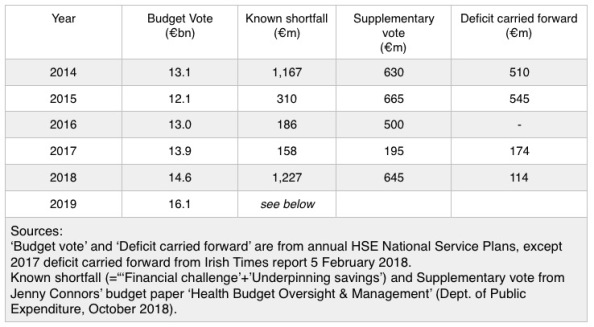The new chief of the HSE has made cost-containment his top priority. Taking office in mid-May, Paul Reid’s first act was to order senior health service managers to live within their assigned resources: spending beyond budget is ‘no longer an option’. He gave department heads ten days to report to him with plans to stay on target. Reid told them: deal with this at your own level, warning that he would hold it an ‘absolute failure of management’ if the problems and risks ‘ultimately arrive at my desk.’
Well good luck with that. The recent history of HSE budgets is a history of political theatre, where health professionals tell the government how much they need for the coming year, the Department of Health cuts it back, and says ‘that’s your lot’. But it never works out.
My table shows that each year since 2014, cost overruns have had to be met by a special vote in the Dáil. Even then, most years have seen an additional unfunded deficit carried forward into the following year, to become a first charge on the next budget.
PLANS AND OUTCOMES

Each year the same drama unfolds: by early summer, we hear the HSE is overspending. Mid-summer, the Minister says there will be no more money. Then in autumn or winter, there is a supplementary vote, and another fictitious budget is prepared for the next twelve months. What was it Einstein said about doing the same thing again and expecting a different result?
Financial Challenge 2019
Under the previous director general, Tony O’Brien, we got used to being told publicly how much the budget would fall short of what was needed. The Department of Health didn’t like it, and the Minister, Simon Harris, told an Oireachtas Committee last year that the budget setting process was ‘too transparent’.
O’Brien left last May, and this year’s HSE National Service Plan doesn’t give a figure for what used to be called the ‘financial challenge’. But scattered through the document we can find reference to various cost savings that add up to more than €400m. Experience suggests those savings cannot be made without noticeable cutbacks in service.
The current NSP acknowledges this, if only in general terms, warning that “even with cost reductions and improved efficiency, it is not possible to respond fully to the level of health and social care needs expected in 2019. Inevitably, difficult choices have had to be made…”
So while Paul Reid cracks the whip of fiscal rectitude, we can see what’s going to happen. In his first week, Reid visited University Hospital Waterford to reinforce his message. The hospital’s response: closure of the surgical theatre for four weeks this summer as part of an effort to save €10m. We’re going to see a lot more of that.
Patrick Kinsella

| Patrick Kinsella is a journalist, having previously worked for RTE and the BBC, and a former lecturer in the Department of Communications at Dublin City University. He continues to freelance for various publications and has contributed to Dublin Weekend Radio and Radio Ireland. |
Share:


![Duggan, Vic]](/assets/img/2017/04/1491994913319631_sq.jpg)